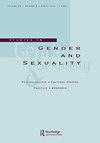Piñones的回忆:毫无疑问的黑人美女
Q3 Social Sciences
引用次数: 0
摘要
摘要本文通过作者和其他黑人女性的视角,对美国殖民地波多黎各历史上黑人占多数的皮诺内斯镇的黑人身份进行了多层面的描述。作者试图打断和反驳对黑人女性及其在社区中角色的主流看法。在与Frantz Fanon的作品对话中,对内化的反黑人种族主义的存在及其影响进行了研究和分析。同样至关重要的是,形成以社区为基础的应对种族主义持续存在的对策,包括建立和正在进行的Piñones se Integra公司(COPI)。本文章由计算机程序翻译,如有差异,请以英文原文为准。
Memories from Piñones: Unapologetically Blackly Beautiful Women
ABSTRACT This is a multilayered account of being a Black person in the historically Black-majority town of Piñones in the U.S. colony of Puerto Rico through the eyes of the author and other Black women. The author seeks to interrupt and counter predominant perceptions of Black women and their roles in the community. The presence and effects of internalized anti-Black racism are studied and analyzed in dialogue with the work of Frantz Fanon. Also crucial is the formation of community-based responses to the persistence of racism, including the creation and ongoing work of the Corporación Piñones se Integra (COPI).
求助全文
通过发布文献求助,成功后即可免费获取论文全文。
去求助
来源期刊

Studies in Gender and Sexuality
Social Sciences-Gender Studies
CiteScore
0.80
自引率
0.00%
发文量
15
期刊介绍:
Beginning in the final two decades of the 20th century, the study of gender and sexuality has been revived from a variety of directions: the traditions of feminist scholarship, postclassical and postmodern psychoanalytic theory, developmental research, and cultural studies have all contributed to renewed fascination with those powerfully formative aspects of subjectivity that fall within the rubric of "gender" and "sexuality." Clinicians, for their part, have returned to gender and sexuality with heightened sensitivity to the role of these constructs in the treatment situation, including the richly variegated ways in which assumptions about gender and sexuality enter into our understandings of "normality" and "pathology."
 求助内容:
求助内容: 应助结果提醒方式:
应助结果提醒方式:


